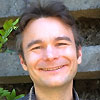Chris Bourke interview - Page 4
Chris: Were you very aware of what the European composers were up to.
Douglas: You must realise that the Royal College of Music was very British… and Schoenberg, Webern and Berg were not heard of then, the College was still trying to come to terms with Bruckner and Mahler.
Chris: Not even Debussy.
Douglas: Debussy was all right.
Chris: History books emphasise importance of these composers, whereas at time, much of world oblivious to them.
Douglas: I think that would be true, and even a figure like Stravinsky was known only by his early ballets then.
Chris: What was attitude to Stravinsky in the 1930s.
Douglas: I can't remember any impact of hearing his music. Bartók, I heard through the Lyceum, the International Society for Contemporary Music.
Chris: So they weren't even on the concert programmes in London.
Douglas: Hardly at all, Beecham would occasionally play a work by Bartók but he would spend most of his rehearsal time on the Mozart and trust the orchestra to somehow get through the Bartók.
Chris: So they weren't even mentioned, not even in a disparaging way.
Douglas: I don't think it was of any concern to them, and I think they've always been a little like this - provincial, as it were, until the advent of a new breed of composer, Benjamin Britten.
Douglas: Broadcasting has made tremendous strides, as far as contemporary music, but its much more apparent than real.
Chris: Vaughan Williams - avoid being clever, don't compose to please yourself.
Douglas: Well, he may have been reacting against people like Sorabji and van Dieren and Busoni. It was van Dieren who said, "lets make our music so difficult that it is not accessible to amateurs". But these things were never mentioned. I think with Vaughan Williams it was just inherent in the man's personality - a forthright, honest worker.
Chris: Best teachers teach by osmosis.
Douglas: The aim of education is not to teach but to equip the mind for learning.
Chris: What did you do after you came back.
Douglas: To begin with I had nearly nine months on the farm in Taihape, then for about three months I was guest conductor with a string orchestra and then I went back to Christchurch and lived in a single room and did a bit of freelancing, enjoyed life … and wrote music for people who were there - a lot of string music, for that reason... Maurice Claire had some really good pupils.
Chris: Already had completed your Centennial pieces.
Douglas: Yes, not so much major pieces but apprentice pieces done at the Royal College of Music, two orchestral overtures and a work for chorus and orchestra, but then I wrote nothing for a full orchestra again until about 1945.
Chris: What was the attitude to a composer in New Zealand.
Douglas: I think, one had a few good friends, but mainly the attitude was: don't we have enough good music already... Why do you have to come and do it differently?
Chris: Hasn't changed much.
Douglas: Oh, you can't believe how much it has changed! It sounds naïve but truly I grew up with the idea that all music had been written by great masters a hundred years before, overseas. And I didn't know whether anyone was allowed to do it here.









